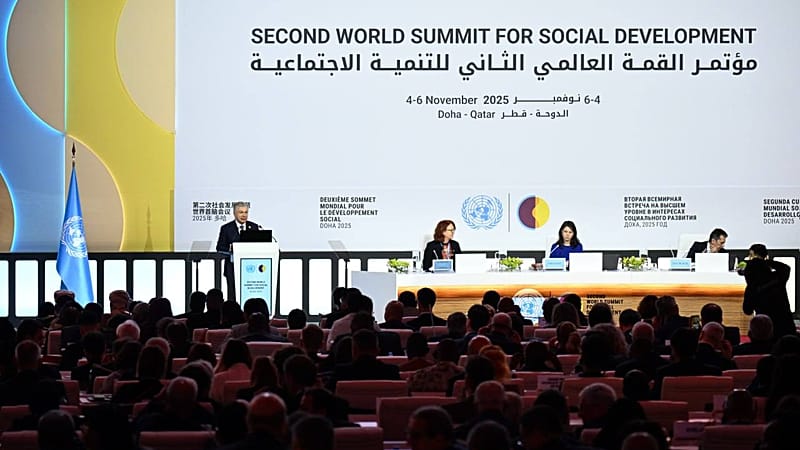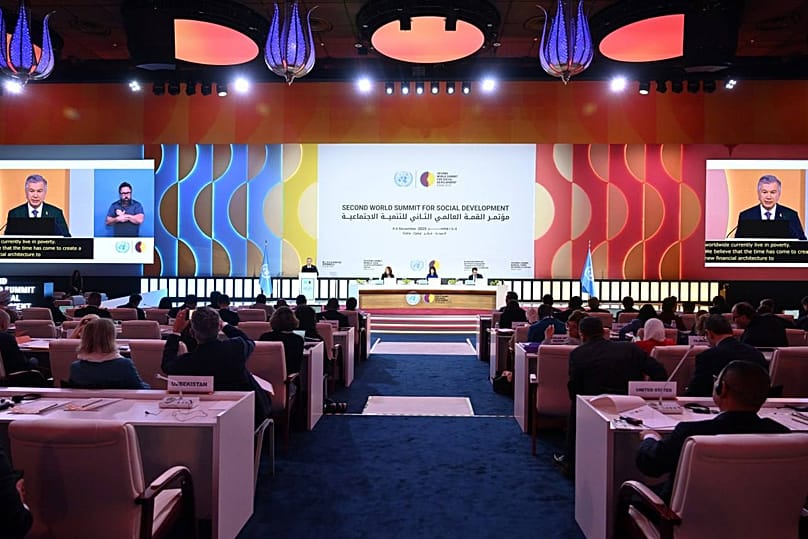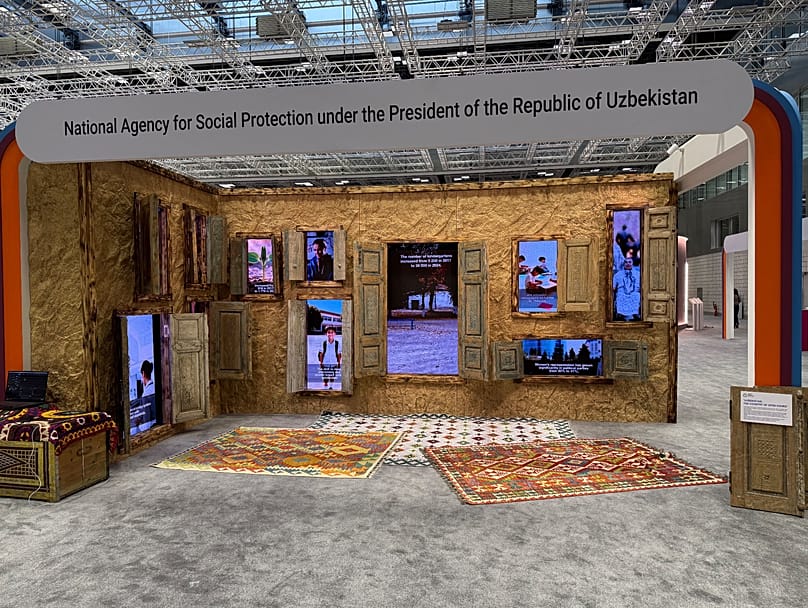Uzbekistan’s vision for a fairer future takes centre stage at the World Summit in Doha

Uzbekistan proposed creating a Global Social Justice Fund and hosting international summits on hunger and migrant protection as President Shavkat Mirziyoyev outlined ambitious social development reforms that reduced his country's poverty rate from 35% to 6.6% at the Second World Summit for Social Development in Doha.
During his speech at the Summit, Mirziyoyev set out new proposals to strengthen global cooperation, social justice, and inclusive development.
He noted that in recent years, Uzbekistan has been building a society in which “human dignity” is central and social justice is guaranteed — a commitment now enshrined in the new constitution, which defines the country as a “social state”.
“Our new social protection model covers every household and family, starting from the mahalla — the grassroots level of society," Mirziyoyev said in his address.
"In recent years, we have reduced the poverty rate from 35% to 6.6%. These reforms will continue."
Mirziyoyev presented Uzbekistan’s vision for a fairer global order — one in which every person, regardless of circumstances, has the opportunity to live with dignity.
He called for the creation of a Global Social Justice Fund to support developing nations in combating poverty, noting that more than a billion people worldwide still struggle to meet basic needs.
The president of Uzbekistan also drew attention to the changing nature of work, warning that rapid advances in automation and artificial intelligence could leave millions unemployed. To address this, he proposed a Global Initiative for Social Responsibility and Decent Work to strengthen workers' social protection worldwide.
In terms of education, Mirziyoyev stressed that illiteracy continues to cost the world economy trillions of dollars each year and fuels growing inequality.
He announced that Uzbekistan is ready to host a future Global Alliance to Combat Hunger and Poverty Summit, placing universally accessible education at the centre of the agenda.
The Uzbekistan leader also urged stronger international protection for the more than 300 million labour migrants worldwide, many of whom face exploitation and discrimination. Uzbekistan stands ready to host an International Forum on the Social and Legal Protection of Migrants and Their Families next year, in cooperation with UN agencies.
Mirziyoyev further highlighted the impact of climate change on vulnerable communities — including in the Aral Sea region, once the site of one of the world’s worst ecological disasters.
Uzbekistan plans to launch a new model of climate-resilient development, combining green innovation with job creation to support people affected by environmental decline.
As, Sherzod Asadov, Press Secretary to the President of the Republic of Uzbekistan, told to Euronews: “In just a few years at the initiative of the President of Uzbekistan, we have implemented a unique national model to ensure that social protection reaches every home and every individual”.
“Over 9,000 communities, or as we call them in Uzbekistan, “mahallas”, employ social workers who identify vulnerable families and connect them to district-level specialized “Inson” centers, nationwide single window, offering various types of assistance”, he added.
Mr. Asadov noted that “social transfers now account for nearly one-third of low-income households' incomes, protecting them from economic shocks and helping to invest in their children's education and health. Thanks to these comprehensive measures, we were able to reduce the poverty rate from 35 percent in 2016 to 6.6 this year”.
According to the Press Secretary to the President of Republic of Uzbekistan, the country “is also enhancing disability support through a new assessment model, expanded assistive technologies, and faster service delivery. Daycare, rehab centers, social taxes, and expanded community-based care are strengthening inclusivity under a growing social strategy”.
“All this demonstrates Uzbekistan's focus on empowering every citizen to reach their potential and build a fulfilling life irrespective of their background”, he said .
A human-centred model rooted in tradition
Usman Sharifkhadjaev, Deputy Director of NASP, emphasised that this transformation marks a new era of human-centred governance.
“Policies should be shaped by hard evidence and by understanding local realities. In Uzbekistan, we have built our model of social service delivery on traditional governance structures such as the mahalla — institutions with deep historical roots in community life,” he said.
Uzbekistan is also pioneering a biopsychosocial disability assessment, doubling the list of assistive technologies and empowering beneficiaries through vouchers.
New day-care and rehabilitation centres, along with social taxi services, help ensure easier access to education, services, and public life for persons with disabilities and children with mobility challenges.
“This reform is not about bureaucracy — it is about people, about bringing dignity, inclusion, and opportunity to every citizen,” Sharifkhadjaev said.
Uzbekistan’s efforts have drawn international praise. UNICEF Deputy Executive Director Omar Abdi highlighted the country’s growing leadership in ensuring that “the last mile” of social services reaches the most disadvantaged children and families.
“When policy, financing, workforce, and technology move together, children and families are better served, and exclusion shrinks,” he said.
'Uzbekistan - The country of open doors'
As part of the official programme, Uzbekistan will share its experience at the Solution Session “Last-Mile First: Innovations and Human-Centred Approach in Social Service Delivery”, together with Belgium, Morocco, Qatar, Turkey, UNICEF, the World Bank and UNDP.
The session focuses on practical steps to ensure that social services reach those most at risk, delivering real change to communities.
Uzbekistan is also presenting an exhibition titled “Uzbekistan — The Country of Open Doors.” Each door symbolises trust, openness, and the country’s readiness for cooperation — reflecting the mahalla's role in driving social transformation at the community level.
One of the doors highlights the consolidation of more than 100 social protection programmes under NASP and the “Inson” Social Service Centres, which now operate in every district and provide a wide range of support services through a single access point. Today, over 120 community-level services are available, benefiting approximately 3 million citizens.
Another door showcases Uzbekistan’s poverty-reduction efforts through its differentiated family assessment system, alongside progress in inclusive education, healthcare, preschool development, sports, women’s empowerment and support for children deprived of parental care.
Hoy



